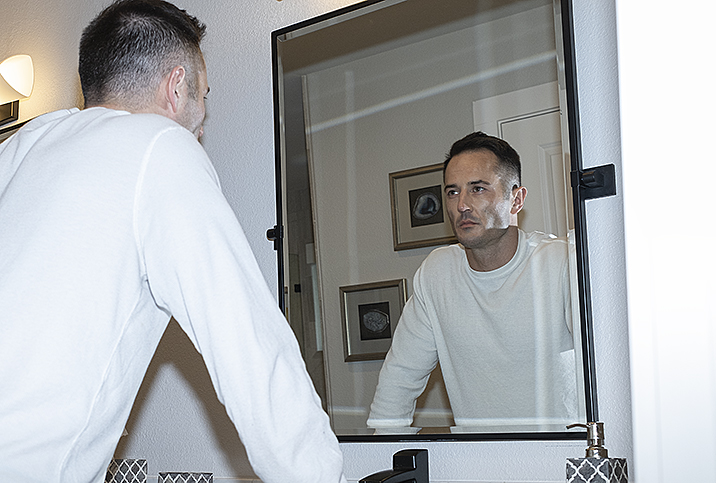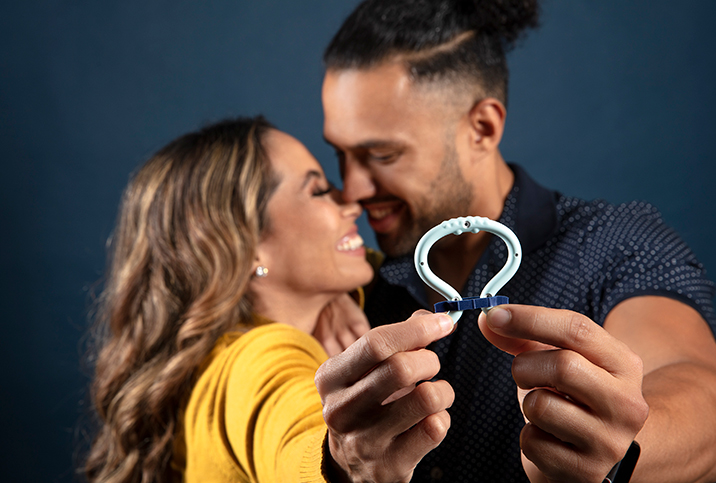Your Partner Isn't to Blame for Your Erectile Dysfunction

The more you learn about erectile dysfunction (ED), the more it becomes apparent it's a perfectly normal, common physical response to a potentially wide variety of physical and emotional stimuli.
Just as nobody can sink 100 percent of their shots from the 3-point line, no one can perform sexually 100 percent of the time; the body doesn't work that way.
When you factor in emotional and cultural baggage that links ED to the penis, it can sometimes cause guys to get into their own heads. Add to the mix that ED can make men feel as if they're letting someone down, and becomes clear as to how it could trigger some unfortunate responses if you're not properly briefed.
One of the most troubling and misguided responses to having a bout of ED is to blame your partner.
What can cause erectile dysfunction?
The first thing to understand about ED is that getting an erection is a complicated process. Getting a hard-on may seem simple during that adolescent and post-adolescent flood of testosterone. But there's a lot going on. Erectile function is the result of a complex, precise and interlocking set of bodily functions.
Erections require proper blood flow and well-functioning nerves, for starters—not to mention the importance of your emotional state. If you're nervous, apprehensive or having relationship problems with a partner, any or all of those things can affect your ability to reliably get hard enough for sex.
"The emotions we feel, whether it's stress or anxiety, frustration, happiness or excitement, we call them 'emotions,' but really they're chemical reactions that have an impact on how the other parts of our body work," said Amy Pearlman, M.D., a men's health specialist and co-founder of Prime Institute in Fort Lauderdale, Florida. "We often say 'stress' or 'performance anxiety,' but we don't actually mean stress, we mean cortisol that's released in our bodies and then has downstream effects on so many parts of our bodies. So if someone is stressed and their cortisol goes up, what happens is the penis doesn't need to work."
For the purposes of achieving an erection (see here), the fight-or-flight reaction of the body doesn't differentiate between encountering a bear in the woods or being emotionally upset or stressed for other reasons. Given that so many factors go into helping a man's penis get erect—emotional, physical, hormonal and so on—it becomes clear that trying to pin it on a single cause is kind of a fool's errand.
Trying to make it your partner's or even your own "fault" is silly.
"It's like any other part of the body. If someone has heart disease, who's fault is that?" Pearlman said. "Is it the fault of someone else in the household who keeps making food that's high in fat or sodium? Or is it the person himself who has heart disease?
"The reality is, for any health condition we have, including sexual functioning, it's sort of like everyone's fault and no one's fault. It's just anatomy and the way our bodies react to certain things."
ED and the blame game
Nonetheless, defensiveness, embarrassment and shame—however misplaced—can lead to blaming others for all sorts of problems, including issues such as ED. Sorting it all out can take some work and dedication.
"I have a couple—they're an older couple and they're going through this right now," explained Natalie Finegood Goldberg, M.A., a marriage and family therapist at Creating Change LA in Beverly Hills, California. "He's finally willing to work on himself around this. But the party line before when she confronted him about his ED was, 'Well, it's you. You're not interested in sex. You're the one.' Projection is a well-known and well-documented defense mechanism."
It's a relatively common effect—defensiveness morphing into blame—when it comes to couples and sex, but Finegood Goldberg often finds communication and openness remain at the heart of these complications.
"In sex therapy, we have an expression: Everyone is responsible for their own orgasm," she said. "It's a lot easier in some cases to point the finger and say, 'You did this differently, or you did that differently,' versus owning one's needs or insecurities or problems. That's not to say that partners don't play a role in someone's sexual pleasure. But it starts with an individual knowing themselves, understanding their needs and being able to guide/direct/ask for whatever it is."
Conclusions
Often the case with men with ED, a better understanding of its mechanics is helpful—which includes how emotions factor in.
Luckily for Finegood Goldberg's clients, the man's partner was able to stand strong and refuse to take the blame for his ED issues. Helping them to work on 'Communication 101' helped their sex life a great deal.
"If the go-to is to point the finger, that's often an indication of a bigger disconnect from one's own experience, their own being, their own body," she said. "There's a lot more vulnerability in saying, 'My body needs x, y, and z. Can you do that for me?'
"The squeaky wheel gets the grease. If you cannot speak up about what your body needs, you're not going to be able to get your needs met. At the end of the day, that's a you problem."


















